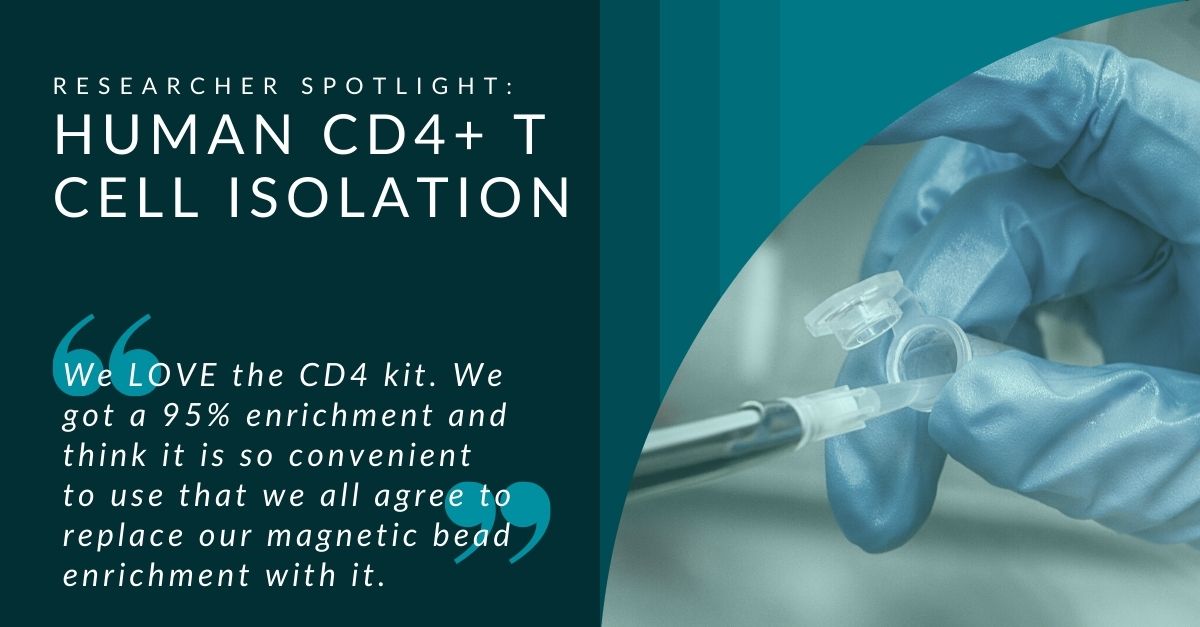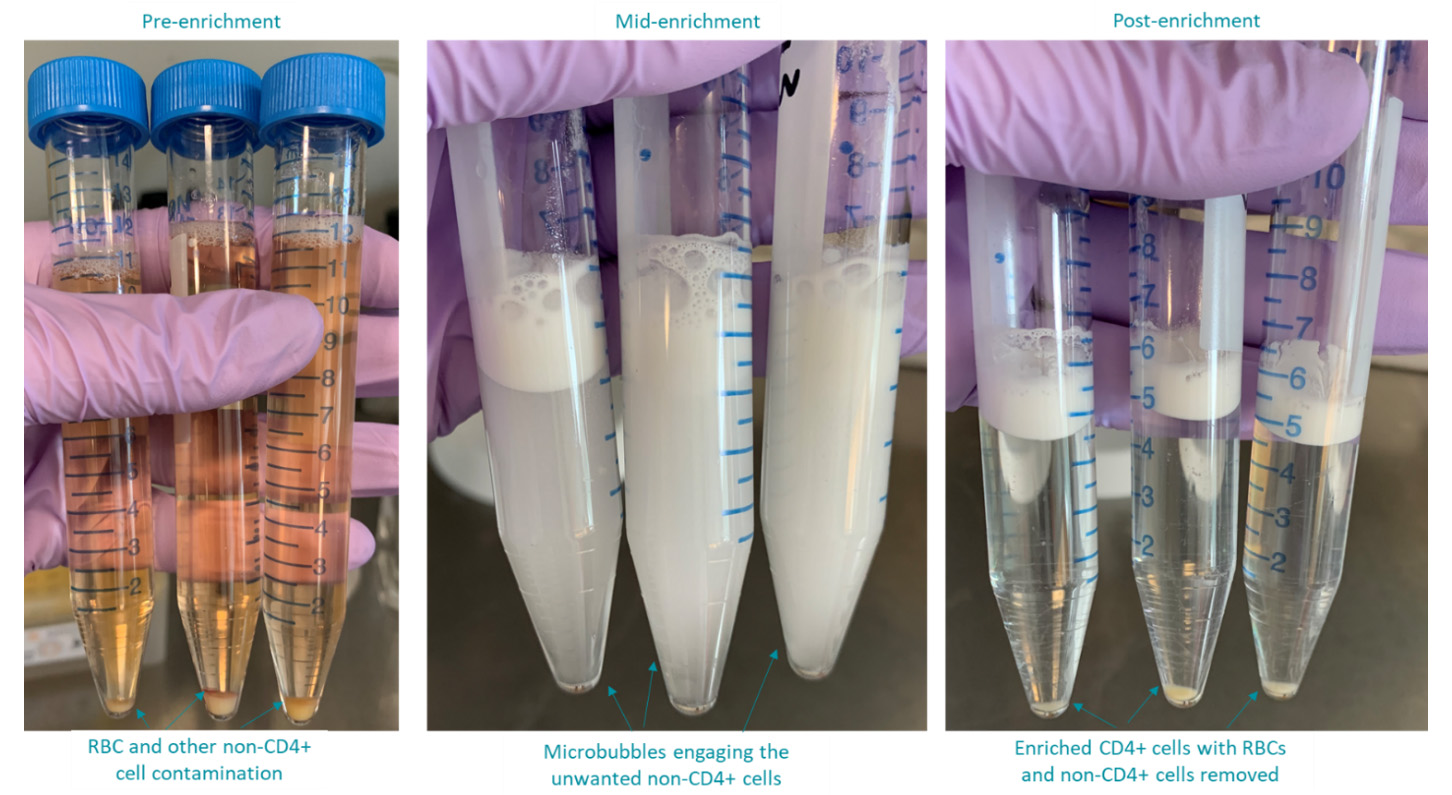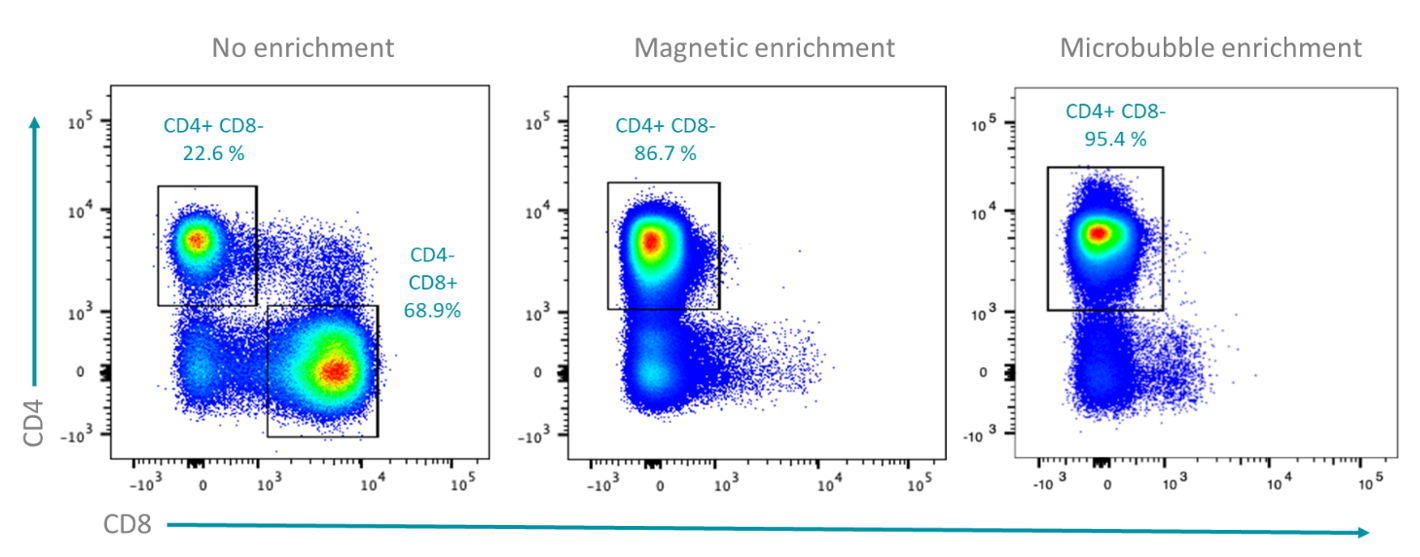Using Akadeum’s Human CD4+ T Cell Isolation to Study Pathogenesis of Human Hepatotropic Viruses
Updated on Jun 17, 2025 Share

Use of Akadeum’s gentle and effective Human CD4+ T Cell Isolation Kit results in a highly enriched sample of human CD4+ T cells, enabling detection and isolation of low-abundance, antigen-specific CD4+ T cells in patient samples.
A research group led by Professor Georg Lauer at Massachusetts General Hospital and the Harvard Medical School recently used Akadeum’s Human CD4+ T Cell Isolation Kit to obtain high purity enrichment of viable, healthy human CD4+ T cells.
Dr. Hannah Drescher, a postdoctoral associate in the laboratory of Dr. Lauer, used the Akadeum CD4+ T Cell Isolation Kit in the course of their work in understanding the correlates of immune protection from chronic viral infection, the mechanisms employed by viruses to escape host immune surveillance, and to develop immunotherapeutic interventions that resurrect exhausted T cells. The research group has established innovative approaches that allow them to overcome longstanding boundaries of immunological research in humans. They have successfully generated complex direct ex-vivo phenotypic and functional descriptions, together with microarray, RNAseq and ATACseq data from both virus-specific CD4 and CD8 T cells in blood and liver in order to define the specific molecular pathways associated with viral control and immune failure.
To accomplish their groundbreaking work, they require cell isolation methods that effectively and efficiently yield high quality cells without sacrificing purity. The antigen-specific CD4+ T cells of interest are of exceptionally low abundance, representing around 0.01% of the original population. For this reason, a fast and easy cleanup step to enrich the CD4+ T cell population is of the utmost importance.
The Akadeum microbubble high throughput human T cell enrichment can be performed directly in the sample container for streamlined sample preparation that does not require additional equipment or expensive consumables like magnets or columns. The microbubble approach is exceptionally gentle on delicate cells and eliminates the need to expose cells to harsh chemicals or external forces like magnetic gradients from rare earth magnets.
Scope of the Project:
Objective:
Successfully obtain a highly-purified population of human CD4+ T cells
Kit Used:
Human CD4+ T Cell Isolation Kit from Akadeum Life Sciences
Procedure:
30 million frozen PBMCs per vial were used. The PBMCs were originally isolated from whole blood using gradient centrifugation. From there, the recommended volume of reagents from the protocol were used, adjusted to account for cell count, and the protocol was followed to enrich the PBMC sample for Human CD4+ T cells.
Key Takeaways:
In a head-to-head comparison with a magnetic bead-based protocol, the Akadeum protocol delivered 95.4% purity as compared to 86.7% with magnetics. In addition to providing excellent purity, the highly-enriched sample allowed for efficient labeling, detection, and collection of antigen-specific cells of low abundance (specifically CD4+ T cells that recognize HBV-specific epitopes).
Outcome:
The sample preparation using Akadeum’s Human CD4+ T Cell Isolation Kit delivered an 8.7% higher purity of human CD4+ T cells than the team’s standard magnetic bead-based processing. The final enriched sample of healthy cells enabled effective collection of the antigen-specific cells of exceptionally low abundance.

Figure 1: Akadeum’s Microbubbles Enable Fast & Easy Sample Enrichment
A) The starting sample contains RBC and other non-CD4+ cell contamination. B) Akadeum’s microbubbles are mixed into the sample, where they engage the unwanted non-CD4+ cells, targeting them for removal. C) Leveraging their inherent buoyancy, the microbubbles and bound non-CD4+ T cells gently float to the top of the sample container for removal, while the untouched CD4+ T cells of interest are pelleted at the bottom.

Figure 2: Comparative Purity of CD4+ T Cells Without Enrichment, with Magnetic Enrichment, and with Microbubble Enrichment
Without enrichment, CD4+ T cells accounted for 22.6% of the sample. Standard magnetic bead-based enrichment delivered a final purity of 86.7%, while Akadeum’s microbubble enrichment performed exceptionally well, resulting in 95.4% purity.

Figure 3: Enrichment of CD4+ T Cells Enables Detection and Isolation of Antigen-Specific CD4+ T Cells from Patient Sample
To identify HBV-specific CD8 and CD4 T cells using tetramer staining, patient-derived T cells that recognize HBV-specific epitopes can be labeled, detected, and collected. Two separate HBV-specific epitopes attached to fluorophores, one labeled with PE and the other with APC, were used.
Akadeum’s Human CD4+ T Cell Isolation Kit delivers a highly enriched population of healthy, viable cells of interest using a protocol that is fast, easy, and gentle on cells. Ideal for processing delicate cells, Akadeum’s novel Buoyancy Activated Cell Separation (BACS™) occurs directly in the sample container without exposing cells to harsh chemicals or harmful shear forces.
If you are involved in cell isolation research, we’d love to hear from you! We are actively seeking new applications for our microbubble technology and would welcome the opportunity to learn more about your research and to discover if our microbubbles could help you in your work. Let’s schedule a time to talk!


